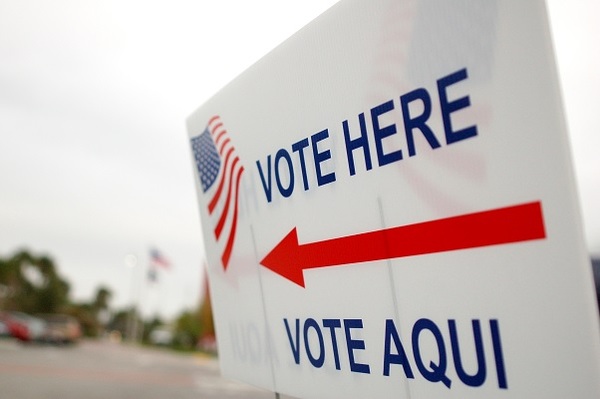
–>
November 30, 2022
With the ongoing invasion over the last two years by millions of foreigners at our southern border, America has a much bigger election integrity problem than before Joe Biden became president. So, just how did California, Arizona, New Mexico and other states with large enclaves of illegal aliens ensure that the recent invaders (as well as the millions of previous invaders from decades past) didn’t vote in the November 8 federal elections?
‘); googletag.cmd.push(function () { googletag.display(‘div-gpt-ad-1609268089992-0’); }); }
You see, noncitizen voting in federal elections is illegal. But Democrats seem to see nothing wrong with the invasion. Indeed, the Left wants illegal aliens to be able to vote in America’s elections; see “Why Non-Citizens Should Be Allowed to Vote” by Ron Hayduk at Jacobin. (Americans who believe in the ideal of citizenship won’t approve of Mr. Hayduk.)
However, if anyone can vote in America’s elections, then just what is the value of American citizenship? Given all the freebies the feds are handing out to the invaders, some citizens may see the invaders as having more rights than they have. Did citizens approve of this largesse?
But voting in federal elections by illegal aliens is just one of many types of election crime, and many of such crimes are simply undetectable using safeguards currently in use. Surely there should be methods to detect election crime. Congress needs to intervene in State elections for federal offices.
‘); googletag.cmd.push(function () { googletag.display(‘div-gpt-ad-1609270365559-0’); }); }
Clause 1, Section 4, of Article I of the Constitution gives the authority to enact laws that govern electing members of Congress (i.e. the federal legislature) to the legislatures of the States. This provision was trampled on in the 2020 election, when the courts in Pennsylvania saw fit to rewrite election law. (That the judges are still at large is disappointing.) But there’s more, so here’s Clause 1 in its entirety (italics added):
The Times, Places and Manner of holding Elections for Senators and Representatives, shall be prescribed in each State by the Legislature thereof; but the Congress may at any time by Law make or alter such Regulations, except as to the Places of chusing [i.e. choosing] Senators.
It would seem, then, that Congress has the power to impose upon the several States its own laws concerning elections of members of Congress. Not only that, but Section 5 of Article I stipulates that (italics added): “Each House [of Congress] shall be the Judge of the Elections… of its own Members.”
 So, Congress can reject States’ elections of federal officials, and refuse to seat their electees. One wonders if the U.S. Senate shall judge the 2022 midterm elections, and especially if it will judge the fitness of one John Fetterman from the Commonwealth of Pennsylvania. There might be a furor if the Senate refused to seat Fetterman, but we’re talking about the “greatest deliberative body in the world.” How could Fetterman possibly make the cut? Imagine an entire Senate made up of Fettermans.
So, Congress can reject States’ elections of federal officials, and refuse to seat their electees. One wonders if the U.S. Senate shall judge the 2022 midterm elections, and especially if it will judge the fitness of one John Fetterman from the Commonwealth of Pennsylvania. There might be a furor if the Senate refused to seat Fetterman, but we’re talking about the “greatest deliberative body in the world.” How could Fetterman possibly make the cut? Imagine an entire Senate made up of Fettermans.
The point here is that Congress could do something about the unfit people we’re getting in our federal offices. But judging Fetterman to be unfit would likely offend Democrat members’ idea of “democracy,” (and we can’t have that). If one is appalled by some of the characters in Congress, blame the entire body for allowing it.
Besides having the power to reject a State’s congressional elections and not seat their electees, Congress also has the prerogative to object to the Electoral College’s certificates for president. That’s a lot of what the January 6 “insurrection” was all about. That the “insurrectionists” brought no firearms to the party doesn’t seem to matter much to the Party of Government.
‘); googletag.cmd.push(function () { googletag.display(‘div-gpt-ad-1609268078422-0’); }); } if (publir_show_ads) { document.write(“
In any event, the Dems seem to think that they are the only ones who have the right to object. Click to watch the entire Joint Session of Jan. 6, 2017, and note the year.
It would be quite healthy for the state of the union if there were a single law for the elections of federal officials to which all the States were subject. Perhaps Congress should require that the States prove that their vote counts for federal offices are correct. How could the States do that?
Here’s a very simple requirement of the States that would make it possible to get much closer to the truth about who are the victors in our federal elections. And that is for Congress to require that each State put an additional datum on ballots that is not currently required — the SSN.
Some might object to this requirement, citing the need for a secret ballot. The term “secret ballot,” however, does not appear in the Constitution. (One supposes that a secret ballot would be a nice thing to have in labor union elections, especially if one wants to avoid a kneecapping.) In order to demonstrate who won the various races, just what would be done with the SSNs?
Well, vote counters would use the SSNs on the ballots to access federal databases to validate the voter. Some ballots would be rejected immediately, such as the ballot of a noncitizen using a phony SSN. Other rejected ballots would need to be “cured,” such as ballots from another State. A record would be made of all rejected ballots which would list the reason for its rejection.
On the morning of Nov. 29, three weeks after Election Day, we still didn’t know what the final makeup of Congress will be. Too many of the States have shown that they’re not up to the task of vote counting. Congress could relieve State vote counters of having to make judgments about signatures and chads and lord knows what else if they just required the SSN to vote.
The centrality of citizenship (terrific two-minute video) and the sanctity of the vote is at the heart of the Left’s efforts to change America forever. The invasion of “new Americans” that Democrats are allowing to happen is far more dangerous to our once great democracy than anything the Russians did on FaceBook. Wake up, America.
Jon N. Hall of ULTRACON OPINION is a programmer from Kansas City.
Image: Erik (HASH) Hersman
<!– if(page_width_onload <= 479) { document.write("
“); googletag.cmd.push(function() { googletag.display(‘div-gpt-ad-1345489840937-4’); }); } –> If you experience technical problems, please write to [email protected]
FOLLOW US ON
<!–
–>
<!– _qoptions={ qacct:”p-9bKF-NgTuSFM6″ }; ![]() –> <!—-> <!– var addthis_share = { email_template: “new_template” } –>
–> <!—-> <!– var addthis_share = { email_template: “new_template” } –>







